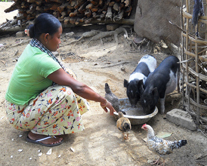

Fighting HIV-related stigma in Bangladesh

When Usima Marma’s husband infected her with HIV and the couple revealed their health status, they were shunned by their community in southeastern Bangladesh. Widowed a few years ago, Usima says she became a laughing stock and struggled to support herself and her 7-year-old son.
'When the news spread, our life became complicated and isolated. Nobody wanted to even talk to us. Other children were not interested in playing with my son. Our life was ruined. Even making a livelihood was nearly impossible. We were stigmatized by the entire society,” she says.
Women infected and affected by HIV are among the world’s most marginalized people. They are poor, socially excluded and possess ill health. Many are unable to find ways to earn a livelihood and meet their daily needs, making them even more vulnerable.
Building economic independence
But women like Usima are getting a boost to improve their economic welfare through a programme implemented by UNAIDS and Ashar Alo Society, a Bangladesh NGO, and financed by the MDG Achievement Fund (MDG-F).
HIV stigma index reports conducted by UNAIDS show that People Living with HIV (PLHIV) and Most At Risk Populations (MARPs) suffer very high levels of violence, stigma and discrimination. A 2011 study found that over half of women living with HIV in Bangladesh have experienced stigma by a friend or neighbor; 87 per cent have decided not to marry because of their HIV status; and nearly a fifth feel suicidal.
Economic dependence on husbands make women more vulnerable; studies have shown that increasing women’s economic independence through income-generating activities can significantly improve their wellbeing, as there is a direct relationship between improved economic condition and reduced violence.
The UNAIDS initiative in Bangladesh identified livestock-raising and handicraft production as the most feasible income-generating activities for women affected by HIV, and conducted trainings in Dhaka, Chittagong and Sylhet in entrepreneurial and business strategy skills. Upon completion of the trainings, participants received grants of BDT 10,000 (about USD $128) to start small businesses.
After attending the IGA trainings, Usima started raising chickens and pigs. The work has earned her a regular income, boosting her and her son’s nutritional health and raising her social status.
“After getting support from the joint programme through Ashar Alo Society (AAS) and due to the treatment and counseling, things changed -- especially after getting the training and the grant support for the pig and chicken rearing. Now I earn more money and my position in the family and in society has changed dramatically,” she says.
Fighting stigma and gender-based violence
The initiative is part of the MDG-F’s Joint Programme to address violence against women (VAW) in Bangladesh by working with the government to improve policies, change attitudes among both women and men, provide care and rehabilitation to survivors of gender-based violence and address women’s vulnerability to HIV/AIDS.
UNAIDS worked with multiple constituencies to address VAW in the context of HIV/AIDS, including self-help groups such as the AAS, the media, the cultural and sports sectors, academicians and parliamentarians.
For Usima, the intiative has not only been personally transformative, it has also enabled her to become a role model.
“I always try to connect new PLHIVs to [the joint programme] to facilitate them to survive. I met new friends in AAS who enabled me to grow socially... Now I am able to advise others according to the training received from the AAS.'
Empowering women worldwide
The aim of the Joint UN Programme to Address Violence against Women in Bangladesh, a collaboration between the government and nine UN agencies (UNDP, ILO, UNFPA, WHO, UNAIDS, UN Women, UNESCO, UNICEF, IOM) is to support the global drive to achieve the Millennium Development Goals, including Goal #3, improving gender equality and women’s empowerment.
The MDG-F has supported 130 programmes in 50 countries around the world aimed at advancing the MDGs.